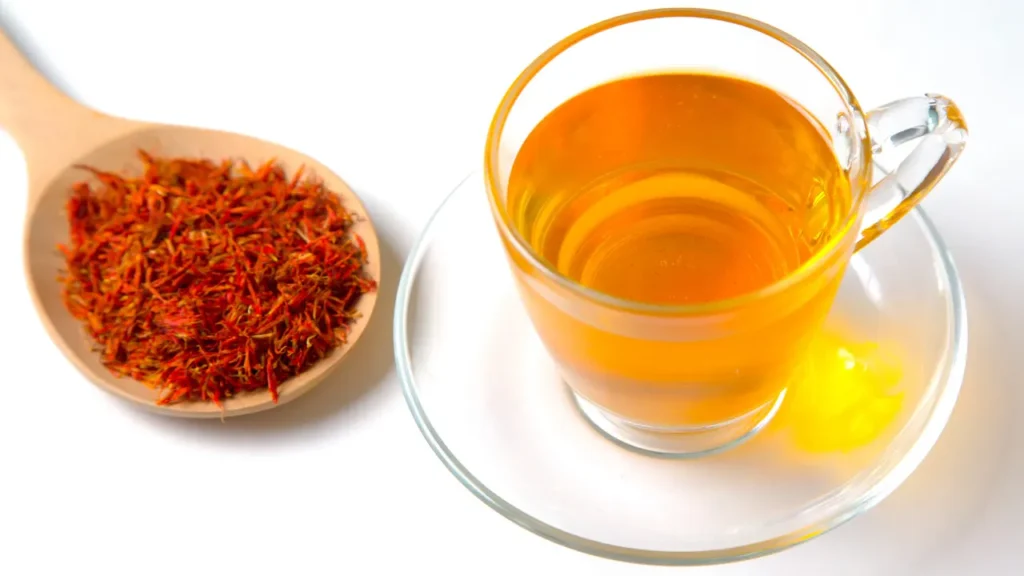The sunflower family’s saffron, Carthamus tinctorius, a thistle-like plant, has been used for ages; it comes from areas that are now part of modern-day Iran. It was historically grown for its flowers, which were used in traditional medicine and food coloring and flavoring, and for its seeds, which yield safflower oil. Safflower has gained popularity recently as a nootropic pill because of its supposed benefits for improving alertness, focus, and cognition. The chemistry of safflower, its health advantages, the best dosage, any side effects, possible drug interactions, and responsible use for improving cognitive function are all covered in this article.
You May Also Like:
NutriRise Ashwagandha Root Capsules Reviewed: A Leading Herbal Stress Support Product
ANTINEOPLASTONS: Benefits, Dosage, Side Effects, Drug Interactions, And Other Important Information
Safflower: Benefits, Dosage, Side Effects, Drug Interactions, and Other Important Information is an original (NootropicsPlanet) article.
Nature of Safflower
Safflower, or Carthamus tinctorius in scientific parlance, is an annual herbaceous plant of the Asteraceae family that is densely branching and resembles a thistle. It is distinguished by its vivid orange, yellow, and red blossoms. Safflower originated in dry regions of the Middle East, but it has since adapted to various climates and is now grown worldwide, mostly for its seeds. Safflower oil is made from the seeds of the safflower plant and is highly valued for its therapeutic and nutritional qualities. Safflower has long been used not only for salad dressing and cooking, but also for the synthesis of colors. It is used in traditional medicine to cure a range of ailments, including heart disease and inflammation.
Health Benefits of Safflower
The health benefits of safflower oil for the brain are multifaceted, primarily due to its rich composition of linoleic acid, vitamin E, and various phytochemicals. These components work synergistically to support cognitive functions, protect neuronal integrity, and promote overall brain health. Here’s a detailed look at how safflower oil can benefit the brain:
Enhancement of Cognitive Functions
- Memory and Learning: The polyunsaturated fatty acids (PUFAs) in safflower oil are essential components of brain cells’ phospholipid membranes. These fats facilitate membrane fluidity, which is crucial for the proper functioning of neurotransmitter receptors and enzymes involved in memory and learning processes.
- Focus and Alertness: Adequate blood flow is vital for cognitive alertness and the ability to maintain focus over extended periods. Safflower oil’s potential to improve vascular health and promote blood circulation can enhance cerebral blood flow, thereby supporting cognitive functions such as attention and concentration.
Neuroprotection
- Antioxidant Protection: The brain is particularly susceptible to oxidative stress due to its high oxygen consumption and lipid-rich environment. Vitamin E, a powerful antioxidant found in safflower oil, helps neutralize free radicals, thereby protecting brain cells from oxidative damage. This antioxidant defense is crucial in slowing cognitive decline and protecting against neurodegenerative diseases.
- Anti-inflammatory Effects: Chronic inflammation has been linked to a range of neurological conditions, including Alzheimer’s disease and other forms of dementia. The linoleic acid and phytochemicals in safflower oil can modulate inflammatory pathways, reducing inflammation and potentially lowering the risk of neuroinflammatory conditions.
Support for Neurotransmitter Synthesis
- Precursor Roles: Fatty acids like linoleic acid are involved in the synthesis of endocannabinoids, which are neurotransmitters that play roles in regulating mood, pain, appetite, and cognitive functions. By providing essential fatty acids, safflower oil may support the balanced production of neurotransmitters, contributing to mood stabilization and cognitive health.
Vascular Health and Cerebral Blood Flow
- Enhanced Blood Flow: Improved blood flow to the brain ensures a steady supply of oxygen and nutrients, which are essential for the maintenance and function of neurons. By influencing the production of vasodilators such as nitric oxide, safflower oil can contribute to better cerebral circulation, which is beneficial for cognitive functions and prevents cognitive decline.
Support in Age-Related Cognitive Decline
- Long-term Brain Health: Regular consumption of safflower oil, with its antioxidant and anti-inflammatory properties, may help mitigate some factors associated with age-related cognitive decline. By protecting against oxidative stress and inflammation, safflower oil can contribute to maintaining neural integrity and function well into older age.
Through its effects on cognitive processes, neuroprotection, neurotransmitter synthesis, vascular health, and possible involvement in alleviating age-related cognitive decline, safflower oil offers a wide range of benefits for brain health. These advantages highlight the importance of incorporating safflower oil into a balanced diet that promotes overall well-being and cognitive function. Safflower oil is a helpful supplement, but it’s vital to remember that other factors—such as lifestyle choices, physical activity, mental exercise, and overall diet—also play a role in maintaining good brain health.

Chemistry of Safflower
The main component of safflower oil, which is made from the seeds of the Carthamus tinctorius plant, is the polyunsaturated omega-6 fatty acid linoleic acid. The human body cannot produce this necessary fatty acid; instead, it must get it from food. Linoleic acid participates in cellular signaling pathways and is essential for preserving the integrity of cell membranes. Safflower oil also includes oleic acid, palmitic acid, and stearic acid, albeit in smaller amounts, in addition to linoleic acid.
Additionally, the oil contains tocopherols, a form of vitamin E that functions as an antioxidant to shield cells from oxidative harm. Safflower’s anti-inflammatory, analgesic, and antioxidant qualities are attributed to flavonoids and other phytochemicals. These compounds play a significant role in the oil’s therapeutic effects, including its potential to enhance cognitive functions and support overall brain health.
Physiological Mechanism of Action
The physiological effects of safflower oil can be attributed to its rich chemical composition, particularly the presence of linoleic acid and antioxidants like vitamin E. The mechanism of action involves several pathways:
Cell Membrane Integrity: As an essential component of cell membranes, linoleic acid is crucial for preserving the fluidity and structure of these membranes. Healthy cell membranes are vital for effective neurotransmission, which powers cognitive functions, including learning, memory, and focus.
Anti-inflammatory Action: Linoleic acid can produce arachidonic acid, a precursor for the synthesis of eicosanoids—molecules involved in inflammation and immunological responses. An overabundance of omega-6 fatty acids can exacerbate inflammation, so maintaining a balance between omega-6 and omega-3 fatty acids is essential. The safflower’s flavonoid and vitamin E content contributes to its anti-inflammatory properties, reducing neuroinflammation and promoting cognitive function.
Antioxidant Activity: Safflower oil’s antioxidants, including vitamin E, scavenge free radicals and lessen oxidative stress. Numerous neurological disorders and the aging process are linked to oxidative stress. Safflower oil may protect brain cells from oxidative damage, improving brain health and cognitive performance.
Vasodilation and Blood Flow: Safflower oil’s linoleic acid affects nitric oxide synthesis, a vasodilator that aids in controlling blood flow, especially cerebral circulation. Increased blood flow makes improved oxygen and nutrition supply to the brain possible, which is crucial for preserving cognitive abilities and general brain health.
Safflower oil can exert beneficial effects on brain health and function by addressing key factors such as cellular integrity, inflammation, oxidative stress, and blood flow. This multifaceted approach underscores the potential of safflower oil as a supplement for cognitive enhancement and the support of neurological well-being.

Optimal Dosage of Safflower
Due to a lack of specialized study, the ideal safflower oil dosage for improving cognition is not well-established. However, scientific trials have employed dosages ranging from 1 to 4 grams of safflower oil per day for advantages to general health, including cardiovascular health. People must speak with medical specialists to determine the correct dosage for their nutrition and overall health.
Side Effects of Safflower
When added to food in moderation or as a supplement by suggested dosages, safflower oil is generally considered safe for most individuals. However, some people could have adverse symptoms like nausea, diarrhea, and gastrointestinal distress. Due to its potential impact on blood coagulation, high dosages of safflower oil, especially from supplements, may also make susceptible people more prone to bleeding.
Potential Substance Interactions with Safflower
Certain medications, such as anticoagulants (blood thinners) and antiplatelet treatments, may interact with sunflower oil, intensifying their effects and raising the risk of bleeding. Moreover, it might interfere with vitamins and plants that have comparable effects, like fish oil, ginkgo, and garlic. Thus, before beginning safflower supplementation, anyone using these drugs or supplements should speak with a healthcare professional.

Best Responsible Uses of Safflower
When supplementing with safflower to improve cognitive abilities, caution must be exercised. This entails observing for any negative effects while beginning at the lower end of the suggested dosage range. It also entails considering underlying medical issues and any drug combinations.
Since safflower’s cognitive effects are indirect, it is best to include them in a comprehensive cognitive health strategy. This entails taking safflower supplements coupled with a balanced diet, consistent exercise, enough sleep, and mental stimulation.
Safflower:
Conclusion
Safflower, a plant-primarily cultivated for its oil-rich seeds and consumed as oil or in supplement form, has demonstrated several potential health benefits, including improved heart health, reduced inflammation, better blood sugar control, enhanced skin health, and support for weight management. However, more research is needed to fully understand the mechanisms underlying these effects and establish optimal dosages and treatment protocols. Individuals interested in incorporating safflower oil or supplements into their diet should consult a healthcare professional, especially if they have specific health concerns or medical conditions.

References:
- The Use of Safflower (Carthamus tinctorius) in Treating Depression and Anxiety. Retrieved from:https://www.ncbi.nlm.nih.gov/pmc/articles/PMC8853973/
- Six health benefits of safflower oil. Retrieved from: https://www.medicalnewstoday.com/articles/322245
- Health Benefits of Safflower Oil. Retrieved from: https://www.webmd.com/diet/health-benefits-of-safflower-oil
- Medical uses of Carthamus tinctorius L. (Safflower): a comprehensive review from Traditional Medicine to Modern Medicine. Retrieved from: https://www.ncbi.nlm.nih.gov/pmc/articles/PMC5984022/
Important Note: The information contained in this article is for general informational purposes only, and should not be construed as health or medical advice, nor is it intended to diagnose, prevent, treat, or cure any disease or health condition. Before embarking on any diet, fitness regimen, or program of nutritional supplementation, it is advisable to consult your healthcare professional in order to determine its safety and probable efficacy in terms of your individual state of health.
Regarding Nutritional Supplements Or Other Non-Prescription Health Products: If any nutritional supplements or other non-prescription health products are mentioned in the foregoing article, any claims or statements made about them have not been evaluated by the U.S. Food and Drug Administration, and such nutritional supplements or other health products are not intended to diagnose, treat, cure, or prevent any disease.


